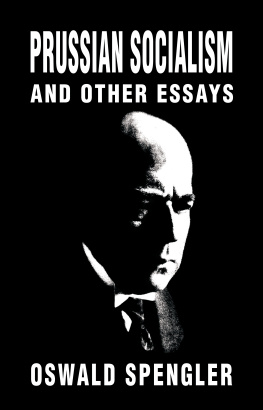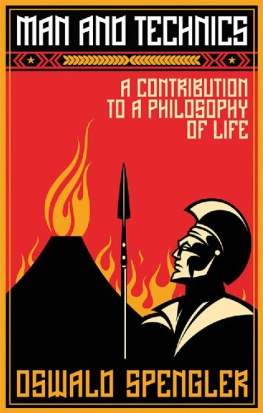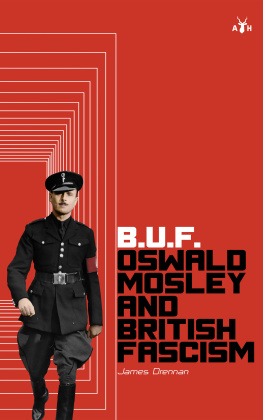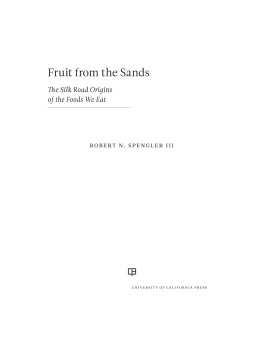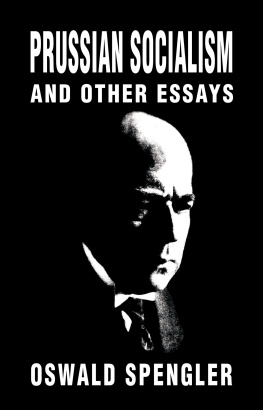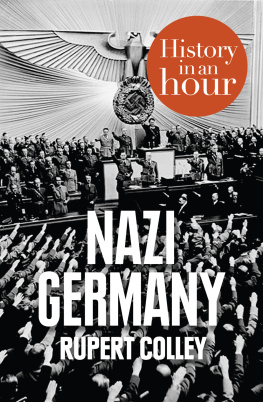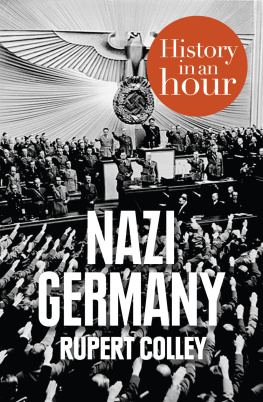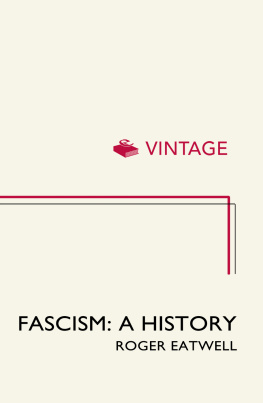Oswald Spengler - The Hour of Decision (1934): Germany and World-Historical Evolution
Here you can read online Oswald Spengler - The Hour of Decision (1934): Germany and World-Historical Evolution full text of the book (entire story) in english for free. Download pdf and epub, get meaning, cover and reviews about this ebook. year: 2018, publisher: Taylor and Francis, genre: Politics. Description of the work, (preface) as well as reviews are available. Best literature library LitArk.com created for fans of good reading and offers a wide selection of genres:
Romance novel
Science fiction
Adventure
Detective
Science
History
Home and family
Prose
Art
Politics
Computer
Non-fiction
Religion
Business
Children
Humor
Choose a favorite category and find really read worthwhile books. Enjoy immersion in the world of imagination, feel the emotions of the characters or learn something new for yourself, make an fascinating discovery.

- Book:The Hour of Decision (1934): Germany and World-Historical Evolution
- Author:
- Publisher:Taylor and Francis
- Genre:
- Year:2018
- Rating:4 / 5
- Favourites:Add to favourites
- Your mark:
- 80
- 1
- 2
- 3
- 4
- 5
The Hour of Decision (1934): Germany and World-Historical Evolution: summary, description and annotation
We offer to read an annotation, description, summary or preface (depends on what the author of the book "The Hour of Decision (1934): Germany and World-Historical Evolution" wrote himself). If you haven't found the necessary information about the book — write in the comments, we will try to find it.
The Hour of Decision (1934): Germany and World-Historical Evolution — read online for free the complete book (whole text) full work
Below is the text of the book, divided by pages. System saving the place of the last page read, allows you to conveniently read the book "The Hour of Decision (1934): Germany and World-Historical Evolution" online for free, without having to search again every time where you left off. Put a bookmark, and you can go to the page where you finished reading at any time.
Font size:
Interval:
Bookmark:

Routledge Revivals
The Hour of Decision
First published in 1934, the main part of this book was developed just prior to the Nazi seizure of power and it also reflects on its aftermath. It assessed the decline of European power and the crisis of Western civilization in the face of conflict between the ruling class and the lower classes in white nations, and the Coloured World Revolution arguing that only by adherence to their inherited Prussianism would Germany have the solidity to be able to combat these dangers. Despite the influence of his previous writings on key Nazi figures, his criticisms of National Socialism in this book led to it being banned, although not before it had been widely distributed throughout Germany.
Germany and the World-Historical Evolution
Oswald Spengler

First published in 1934
by George Allen and Unwin
This edition first published in 2017 by Routledge
2 Park Square, Milton Park, Abingdon, Oxon, OX14 4RN
and by Routledge
711 Third Avenue, New York, NY 10017
Routledge is an imprint of the Taylor & Francis Group, an informa business
1934 Oswald Spengler
All rights reserved. No part of this book may be reprinted or reproduced or utilised in any form or by any electronic, mechanical, or other means, now known or hereafter invented, including photocopying and recording, or in any information storage or retrieval system, without permission in writing from the publishers.
Publishers Note
The publisher has gone to great lengths to ensure the quality of this reprint but points out that some imperfections in the original copies may be apparent.
Disclaimer
The publisher has made every effort to trace copyright holders and welcomes correspondence from those they have been unable to contact.
A Library of Congress record exists under LC control number: 34002638
ISBN 13: 978-1-138-28920-8 (hbk)
ISBN 13: 978-1-315-26714-2 (ebk)
OSWALD SPENGLER
THE
HOUR OF DECISION
PART ONE: GERMANY
AND WORLD-HISTORICAL EVOLUTION

Copyright in the U.S.A. 1934.
FIRST PUBLISHED IN GREAT BRITAIN, 1934
All rights reserved
Printed in Great Britain by
Kimble & Bradford, London, W. 1
On the worlds loom
Weave the Norns doom,
Nor may they guide it nor change.
RICHARD WAGNER:
Siegfried (Act III)
Germany is not an island, p. 5. Dread of reality, p. 7. Rationalism and Romanticism, p. 9. The deceptive peace, 18711914, p. 17. Greatness of the age, p. 18.
The age of world wars, p. 23. Between past and future forms of power, Metternich, p. 27. The first world war threatened from 1878, p. 28. 1918 decided nothing, p. 33. End of Europe, 33. Decline of the dignity of the State from the Congress of Vienna, p. 34. Democratic nationalism, p. 38. Economics mightier than politics: germ of the economic crisis, p. 40. Transformation of armies and strategic ideas, p. 45. Navies and colonies, p. 49. Economic warfare, p. 55. New powers, p. 58. Russia once more Asiatic, p. 60. Japan, p. 64. The United States and revolution, p. 67. England, p. 72. France, p. 76. Standing out of world politics does not protect against their consequences, p. 79.
The revolution from below, p. 81. Age of the Gracchi in Rome, p. 82. Not economic, but urban: dissolution of society, p. 86. Society as order of rank, p. 89. Differences, not contrasts, p. 92. Underworld of great cities: noble and vulgar, p. 94. Goal of the Revolution: the levelling of society. Democracy = Bolshevism, p. 95. Property, luxury, wealth, p. 97. Class war begins about 1770, p. 105. In England, p. 107. The united movement from Liberalism to Bolshevism, p. 109. Mobilization of the working class 99 from 1840. Dictatorship of the proletariat, p 110. Professional agitators, p. 110. Bolshevism not Russian, p. 115. Tolerance of Liberal society, p. 117. Cult of the worker, p. 121. Type of the demagogue, p. 122. Church and class war, Communism and religion, p. 124. Economic egoism as the moral of class war, p. 131. Age of revolutionary theory, 17501850. National economy from 1770 onward belongs to it, p. 136. Negative ideal of class war: from 1770, destruction of the order of rank; from 1840, of the economic order, p. 137. Capitalism and Socialism as moral concepts, p. 140. Socialism as capitalism from below, 141.
The White Revolution now at its goal: the world economic crisis has been sought by the proletariats leaders since 1840, p. 144. The labour leader as the victor of 1918, p. 147. Class war by means of the shortening of working hours and raising of wages, p. 151. Substitution of the political wage as weapon in place of the surplus-value theory, p. 154. Extent and effect of the political wage, p. 156. Triumph of inferior mass labour over constructive work, p. 159. Peasantry and urban luxury wages, p. 161. The hectic pace of economic development a consequence of wage pressure, p. 163. Expansion of finance-capital a further consequence, p. 165. End of industrial monopoly of the white working class, p. 167. The coloured wage enters the contest, p. 168.
The white economic system already undermined by 1900, p. 170. Crash of the World War not brought about, but only no longer averted, p. 171. Dictatorship of the Labour parties over State and economics since 1916. Unemployment, p. 172. Robbing of society, p. 175. Lack of insight. Inflation, autarchy, provision of work, p. 176. Class war not yet over, p. 180. Two fronts, p. 181. What is Le ft ? p. 184. Meaning of Fascism, p. 186. Preussentum und Sozialismusp. p. 188. Close of the revolution from below. Caesarism, p. 195. Individualism as the Nordic life-form, p. 200.
Fact of two revolutions: class war and race war, p. 204. The revolution from without against the Roman Imperium, p. 206. Position of the white nations. Versailles a victory for the coloured world, p. 209. Asia active: Russia and Japan, p. 213. Indians, p. 215. Negroes, p. 216. India and China, p. 217. Weariness of the white nations: barrenness, p. 221. Pacifism, panem et circenses, p. 223. Danger of an understanding between the coloured and the white proletariat, p. 228. Entry into the decisive decades, p. 229.
follows p. 230
No one can have looked forward to the national revolution of this year with greater longing than myself. The sordid Revolution of 1918 I detested from its first day, for it was the betrayal by the inferior part of our people of that strong, live part which had risen up in 1914 in the belief that it could and would have a future. Everything of a political nature that I have written since then has been directed against the forces which had entrenched themselves, with our enemies help, on the mountain of our misery and misfortune in order to render this future impossible. Every line that I wrote was meant to contribute to their overthrow, and I hope that it has done so. Something had to come in one form or another to release the deepest instincts in our blood from that load, if we were, like others, to have a voice and to act in the coming world-crises and not merely be their victim. The great game of world politics is not over. Only now are the highest stakes being played for. Every living nation must rise to greatness or go under. But the events of this year allow us to hope that the decision in our case has not yet been made that we, as in Bismarcks day, shall sooner or later again be subjects and not mere objects of history. The decades in which we live are stupendous and accordingly terrifying and void of happiness. Greatness and happiness are incompatible and we are given no choice. No one living in any part of the world of today will be happy, but many will be able to control by the exercise of their own will the greatness or insignificance of their life-course. As for those who seek comfort merely, they do not deserve to exist.
Font size:
Interval:
Bookmark:
Similar books «The Hour of Decision (1934): Germany and World-Historical Evolution»
Look at similar books to The Hour of Decision (1934): Germany and World-Historical Evolution. We have selected literature similar in name and meaning in the hope of providing readers with more options to find new, interesting, not yet read works.
Discussion, reviews of the book The Hour of Decision (1934): Germany and World-Historical Evolution and just readers' own opinions. Leave your comments, write what you think about the work, its meaning or the main characters. Specify what exactly you liked and what you didn't like, and why you think so.

